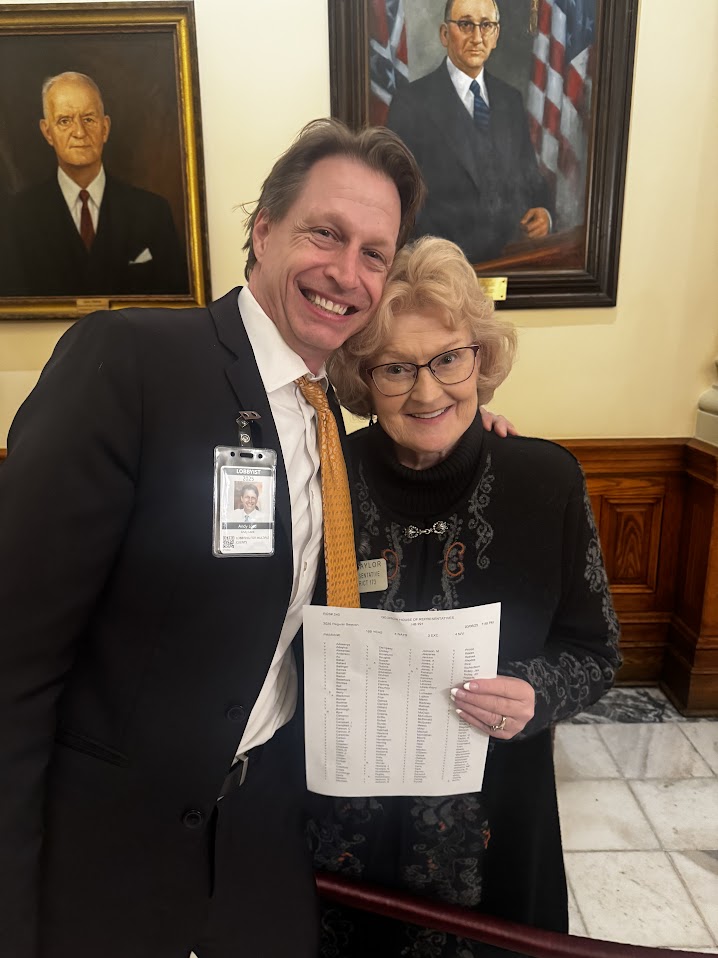Department heads across state agencies began outlining their spending priorities this week in joint budgetary hearings hosted by the Georgia Senate and General Assembly. During the hearings, department heads broke down…
Blog ()
- Home
- >
- consumers
Tag: consumers

Week 5: Strengthening Insurance Enforcement
The House is advancing legislation that would give Georgia’s Insurance Commissioner significantly stronger tools to hold insurance companies accountable when they break consumer protection laws. House Bill 1262 would increase fines for violations of mental health parity requirements, surprise billing protections, and other insurance consumer protection laws from $2,000/$5,000 to $10,000/$25,000 per violation.
For large insurance companies, current fines of $2,000 or $5,000 per violation may be too small to deter misconduct. Stronger enforcement tools help ensure that insurance companies actually follow existing consumer protection laws, including mental health parity requirements under HB 1013.
This week at a glance:
- HB 1262 is on the agenda for the House Health Insurance subcommittee tomorrow (Wed., 02/18).
- HB 1002, which would move Georgia’s foster children from Medicaid managed care to a Fee-for-Service Medicaid model, and HB 1192, which would increase budgetary oversight of the Department of Community Health (DCH) and the Department of Human Services, are scheduled to be heard in the House Health Committee tomorrow (Wed., 02/18).
- SB 428, which would allow DCH to apply for a Home and Community Based Services Medicaid waiver for Georgians suffering from severe mental illness, is on the agenda in Senate Health and Human Services tomorrow.

Week 4: House passes Amended FY26 budget and signals priorities for health and human services
On February 5, the Georgia House of Representatives passed its version of the Amended Fiscal Year 2026 (AFY26) state budget. The amended budget adjusts current-year spending and reflects lawmakers’ priorities for any remaining state dollars.
Here is what the House version means for health care, human services, and the programs Georgians rely on:
The Big Picture
The House budget totals $42.3 billion, a significant increase over the original FY 2026 budget, thanks to $3.3 billion in one-time investments of surplus funds. Among its health-related priorities, the House makes notable investments in Georgia’s foster care system, the health care workforce pipeline, rural health access, and mental health infrastructure. The House largely aligns with the Governor on Medicaid and PeachCare funding, with a few targeted additions.
LEGISLATIVE UPDATE: WEEK 11

The 2025 legislative session is in its final stretch, with just a few days left until Sine Die (the last day of the session) on Friday, April 4th. Lawmakers are racing to finalize key bills and the state budget—and there’s still time for you to speak up.
Things can move quickly in these final days, and last-minute advocacy opportunities may arise. Stay connected with us on social media throughout the week so you don’t miss a chance to take action when it matters most.
After the session ends, we’ll share a full recap, including updates on health care bills that passed (or didn’t), what it all means for Georgians, and any health-related study committees that will convene before next year’s session. In the meantime, you can check out our bill tracker to follow the legislation we’re monitoring as we get closer to Sine Die.
(more…)LEGISLATIVE UPDATE: WEEK 10

The 2025 legislative session is in its final stretch, with two weeks left until session ends on April 4th. With only a few legislative days left, lawmakers are working quickly to finalize key bills and the state budget. You can view the legislative schedule here.
Ending the Practice of Subminimum Wage in Georgia
Last week, the House passed Senate Bill 55, the Dignity and Pay Act. The bill now heads to the Governor for final approval. SB 55 phases out the use of 14(c) certificates in Georgia to pay subminimum wages (below the federal minimum wage of $7.25/hr) to workers with disabilities.
Initially intended to promote employment for disabled veterans, Section 14(c) of the 1938 Fair Labor Standards Act (FLSA) permits paying people with disabilities wages below the statutory federal minimum wage. Section 14(c) can no longer apply to disabled veterans, yet it remains a legal way to pay people with disabilities – usually people with developmental disabilities (DD) – below minimum wage. (Employers using 14(c) waivers often pay disabled employees just pennies per hour.) More than 85 years after the law’s initial passage, the policy has frequently led to exploitation—leaving workers with developmental disabilities earning wages far below the poverty line in roles that offer little chance for growth or advancement.
(more…)LEGISLATIVE UPDATE: WEEK 9

With Crossover Day behind us, the pace at the Capitol is picking up. Lawmakers are moving quickly to debate and vote on bills that survived the deadline, while the budget process moves full speed ahead.
Take Action: Advocate for More GHVP Funding!
The Georgia Housing Voucher Program (GHVP) was created to help Georgia meet its legal obligations under the Olmstead Agreement, which requires the state to provide community-based housing for people with serious and persistent mental illness (SPMI) instead of institutionalizing them. GHVP is a permanent supportive housing program that helps these individuals secure stable housing, avoid homelessness, and access essential services. The program directly pays rent to landlords and provides ongoing support to keep residents housed and connected to care.
Despite its success, GHVP has been underfunded for years. The House added $1.7 million for GHVP in the FY26 budget, but at least $20 million more is needed to expand housing support and fulfill Georgia’s legal and moral obligations. We need your help to urge the Senate Appropriations Health and Human Resources Subcommittee and Appropriations Chair Blake Tillery to increase GHVP funding by $20 million.
Contact the Senate Appropriations Committee today!
House Passes FY26 Budget – What’s Next?
(more…)LEGISLATIVE UPDATE: WEEK 8

Crossover Day has come and gone, and the final stretch of the 2025 legislative session begins!
With just 12 legislative days left before Sine Die on April 4, lawmakers will move quickly to vote on the bills that made it through this key deadline. The legislature will pack the next three weeks with committee hearings, floor votes, and last-minute negotiations.
We’re thrilled to share that HB 291, the Community Health Worker certification bill, passed the House late Thursday night! The House passage of HB 291 is a big win for Georgia’s Community Health Workers and the communities they serve. Join us in sending a huge “Thank you!” to our partners at Georgia Watch and all the advocates who worked tirelessly to get this bill through the House—your efforts made this progress possible! Let’s keep up the good work to ensure this bill successfully passes through the Senate!
Keep reading for a full breakdown of what survived Crossover Day and what comes next for health care at the Capitol.
(more…)The Georgia Department of Community Health (DCH) has reopened the public comment period for the Pathways to Coverage® waiver extension. The new deadline to submit comments is March 19, 2025. This means you have another chance to speak up and demand better health care for Georgians.
Pathways to Coverage launched in July 2023 as a Medicaid program that requires participants to work or meet strict activity requirements to keep their health coverage. Unfortunately, the program has failed to deliver. For example:
(more…)LEGISLATIVE UPDATE: WEEK 7

New Bill to Protect Free Preventive Care (SB 262) Introduced
Last week, Senator Halpern introduced Senate Bill 262 with the support of six Republican co-sponsors! This bill is crucial to ensure that Georgians can continue accessing life-saving preventive health services without facing financial barriers.
Why This Matters
Since 2010, most health plans have been required to cover critical preventive services— such as cancer screenings, routine wellness visits, and mental health screenings—at no cost to patients. However, this vital benefit is under serious threat.
This summer, the U.S. Supreme Court will rule in Kennedy v. Braidwood, a lawsuit that seeks to overturn the free preventive services requirement. Nearly 5 million Georgians could lose guaranteed access to no-cost preventive care if the Court strikes down these protections.
(more…)LEGISLATIVE UPDATE: WEEK 6

Community Health Worker Certification Bill (HB 291) Updated with Key Revisions
The bill to establish a certification process for Community Health Workers (CHWs) has been amended with some key updates. HB 291 is now scheduled to be heard today at 1:00 pm in the House Public and Community Health Committee. If passed, the bill will create a standardized certification process to support and expand Georgia’s CHW workforce. These trusted public health professionals help people navigate the health care system and access essential services, particularly in underserved communities.
What’s New in the Amended Bill?
(more…)LEGISLATIVE UPDATE: WEEK 5

Will New PBM Reforms Lower Drug Prices in Georgia?
Pharmacy Benefit Managers (PBMs) are companies that help insurance plans manage prescription drug benefits. They decide which medications are covered, negotiate prices with drug manufacturers, and set payment rates for pharmacies. While PBMs can lower drug costs by getting discounts from drug makers and pharmacies, they also have significant control over medication pricing, patient access, and pharmacy reimbursements. Critics argue that PBMs’ business practices can drive up costs for consumers and independent pharmacies, while supporters believe they help manage drug spending and ensure affordability. Additionally, PBMs are often owned by an insurer or pharmacy, meaning these PBMs are managed by the same stakeholders that set drug prices for consumers.
(more…)Stay Connected
GHF In The News
Archive
- February 2026
- January 2026
- November 2025
- October 2025
- September 2025
- August 2025
- July 2025
- June 2025
- May 2025
- April 2025
- March 2025
- February 2025
- January 2025
- October 2024
- May 2024
- April 2024
- March 2024
- February 2024
- January 2024
- December 2023
- October 2023
- July 2023
- April 2023
- March 2023
- February 2023
- January 2023
- December 2022
- October 2022
- September 2022
- August 2022
- June 2022
- April 2022
- March 2022
- February 2022
- January 2022
- December 2021
- November 2021
- October 2021
- September 2021
- August 2021
- June 2021
- May 2021
- April 2021
- March 2021
- February 2021
- January 2021
- December 2020
- November 2020
- October 2020
- September 2020
- July 2020
- June 2020
- May 2020
- April 2020
- March 2020
- February 2020
- January 2020
- December 2019
- November 2019
- October 2019
- September 2019
- August 2019
- July 2019
- May 2019
- April 2019
- March 2019
- February 2019
- January 2019
- December 2018
- November 2018
- October 2018
- September 2018
- August 2018
- July 2018
- June 2018
- May 2018
- April 2018
- March 2018
- February 2018
- January 2018
- December 2017
- November 2017
- October 2017
- September 2017
- August 2017
- July 2017
- June 2017
- May 2017
- April 2017
- March 2017
- February 2017
- January 2017
- December 2016
- November 2016
- October 2016
- September 2016
- August 2016
- July 2016
- June 2016
- May 2016
- April 2016
- March 2016
- February 2016
- January 2016
- December 2015
- November 2015
- October 2015
- September 2015
- August 2015
- July 2015
- June 2015
- May 2015
- April 2015
- March 2015
- February 2015
- January 2015
- December 2014
- November 2014
- October 2014
- September 2014
- July 2014
- May 2014
- March 2014
- January 2014
- December 2013
- October 2013
- September 2013
- August 2013
- July 2013
- June 2013
- May 2013
- April 2013
- March 2013
- February 2013
- January 2013
- November 2012
- October 2012
- September 2012
- July 2012
- June 2012
- May 2012
- April 2012
- March 2012
- February 2012
- January 2012
- December 2011
- November 2011
- October 2011
- September 2011
- August 2011
- July 2011
- June 2011
- April 2011
- March 2011
- February 2011
- January 2011
- December 2010
- November 2010
- October 2010
- September 2010
- August 2010
- July 2010
- June 2010
- May 2010
- April 2010
- March 2010
- February 2010
- January 2010
- December 2009
- November 2009
- October 2009
